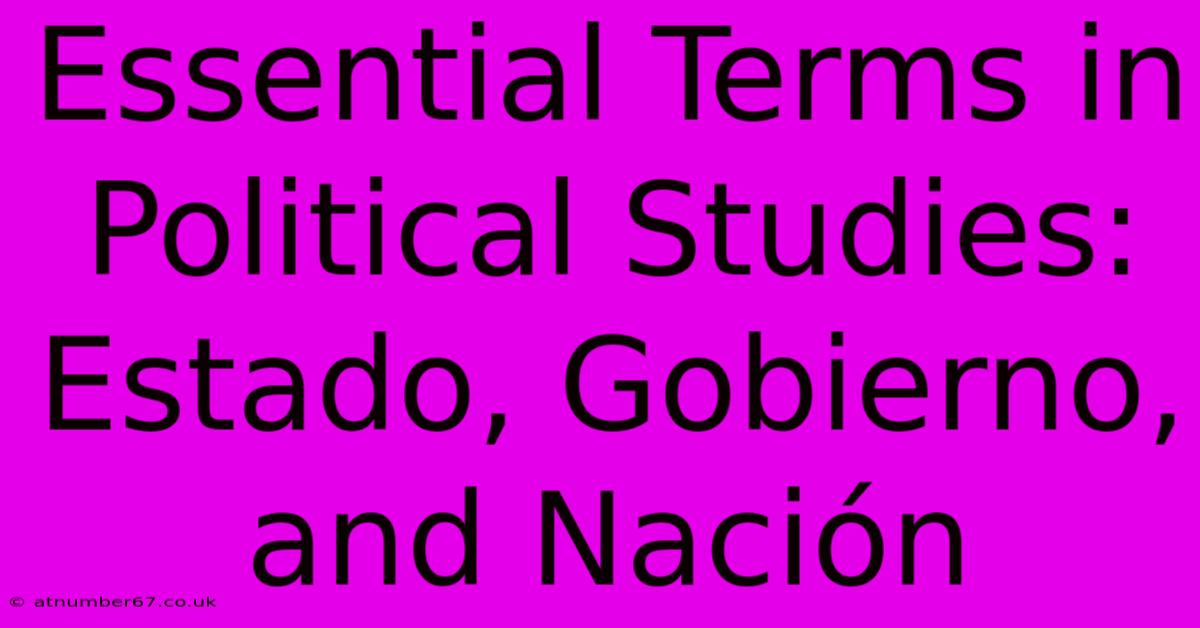Essential Terms In Political Studies: Estado, Gobierno, And Nación

Table of Contents
Essential Terms in Political Studies: Estado, Gobierno, and Nación
Understanding the nuances of political systems requires grasping key concepts that often get conflated. In this article, we'll delve into three crucial terms frequently used in political studies: Estado, Gobierno, and Nación. While related, they represent distinct yet interconnected elements of a political entity. Mastering these definitions is essential for anyone seeking a deeper understanding of political science, sociology, and international relations.
Estado: The State and its Attributes
The term Estado, often translated as "State," refers to the permanent political entity possessing a defined territory, a population, and a monopoly on the legitimate use of force within its borders. It's the overarching structure, the apparatus of power encompassing various institutions. Key attributes of the Estado include:
- Sovereignty: The State possesses supreme authority within its territory, free from external interference. This includes the power to make and enforce laws, collect taxes, and maintain order.
- Legitimacy: A State's authority is generally accepted by its population. This legitimacy can stem from various sources, including tradition, charisma, performance, or legal frameworks.
- Territory: Clearly defined geographical boundaries mark the State's jurisdiction. This includes land, sea, and airspace.
- Population: A group of individuals residing within the State's territory, subject to its laws.
- Institutions: The State comprises a complex web of institutions, including the executive, legislative, and judicial branches, as well as bureaucratic agencies and security forces. These institutions are responsible for implementing and enforcing State policies.
It's crucial to distinguish the Estado from the government. The State endures beyond any specific government. Governments change, but the State remains.
Gobierno: The Government and its Function
Gobierno, translated as "Government," refers to the group of individuals currently exercising the supreme power within the Estado. It's the administration of the State, responsible for implementing its policies and laws. Unlike the enduring State, the Government is temporary and can change through elections, coups, or other means. The Government's functions include:
- Policy Making: Formulating and enacting laws and regulations.
- Enforcement: Implementing and enforcing laws through various administrative and security agencies.
- Service Provision: Providing essential public services like healthcare, education, and infrastructure.
- Representation: Acting as a representative of the State's interests both domestically and internationally.
The composition of the Gobierno varies depending on the political system. It could be a monarchy, a parliamentary system, a presidential system, or a hybrid form. Different systems offer distinct mechanisms for selecting and replacing the Gobierno.
Nación: The Nation and its Identity
Nación translates to "Nation," and it signifies a group of people sharing a common identity based on factors like language, culture, history, and ancestry. Unlike the Estado, which is a political entity, the Nación is primarily a social and cultural construct. A Nation doesn't necessarily have a territory or political structure. This is where things get complex, with several possibilities:
- Nation-State: This is the ideal scenario where a Nation coincides with the boundaries of a State. The population of the State largely identifies with the Nation.
- Multinational State: A single State contains multiple Nations within its borders. Examples include Canada, Spain, and the United Kingdom.
- Stateless Nation: A Nation without its own State. The Kurds are a prime example of a stateless nation.
Understanding the relationship between the Estado, Gobierno, and Nación is fundamental for comprehending contemporary political dynamics. Conflicts often arise when these entities are misaligned, such as in cases of stateless nations or internal conflicts within multinational States. The study of these terms provides a crucial framework for analyzing political stability, national identity, and the challenges of governance in a complex world.

Thank you for visiting our website wich cover about Essential Terms In Political Studies: Estado, Gobierno, And Nación. We hope the information provided has been useful to you. Feel free to contact us if you have any questions or need further assistance. See you next time and dont miss to bookmark.
Featured Posts
-
Virat Kohli Age Staying At The Top Of His Game
Apr 12, 2025
-
Hair Goals Achieved With Carols Daughter Goddess Strength
Apr 12, 2025
-
Khaby Lames Net Worth Is He A Self Made Millionaire
Apr 12, 2025
-
Kanye Wests Net Worth More Than Just Music
Apr 12, 2025
-
Are Sugars Ruining Your Skin Find Out
Apr 12, 2025
